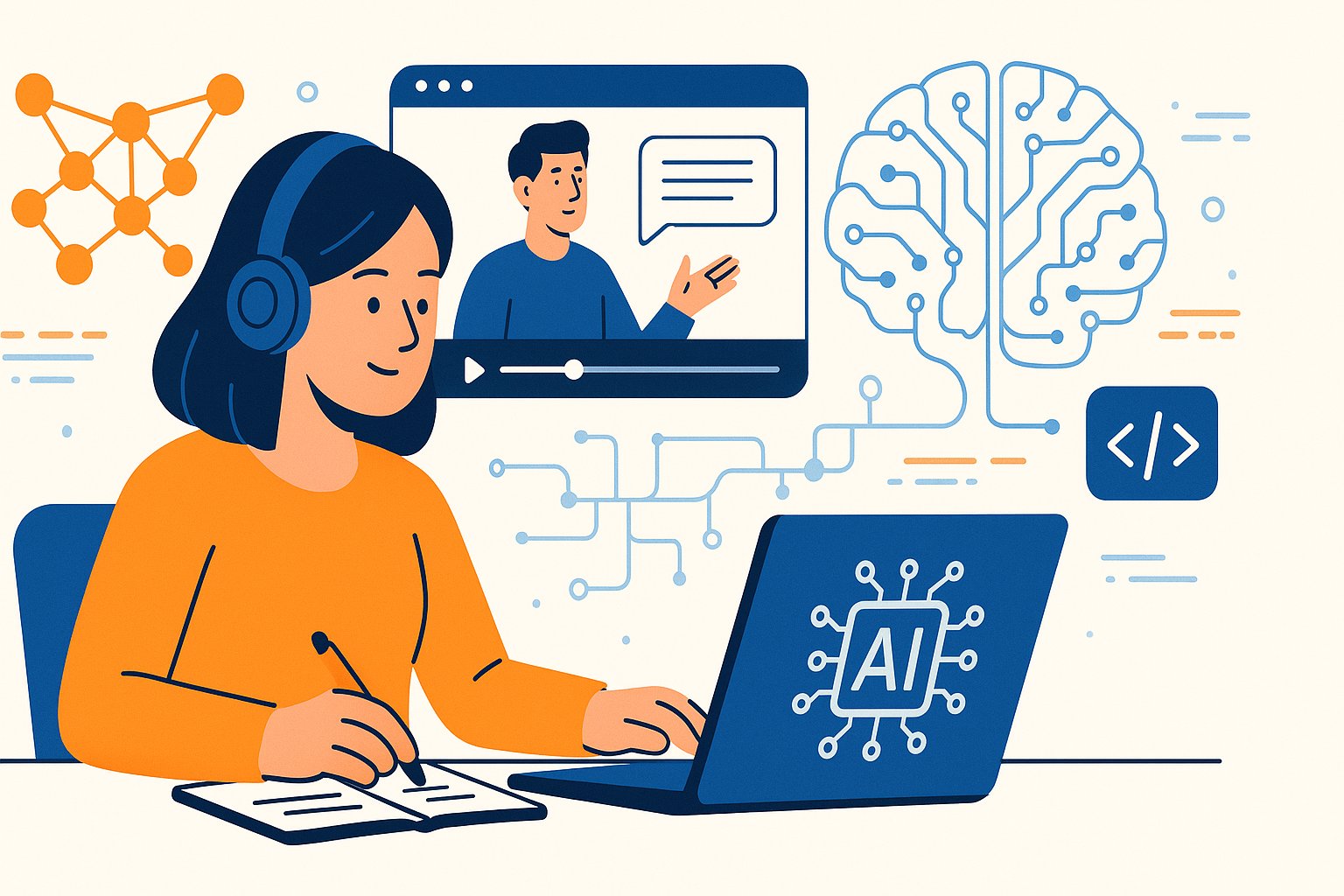6 Essential AI Courses for Safety Engineers in 2025
Discover the top six AI courses tailored for safety engineers in 2025, designed to enhance skills in risk assessment, automation, and data analysis, ensuring you stay ahead in a rapidly evolving field. Perfect for boosting your career in tech and safety.
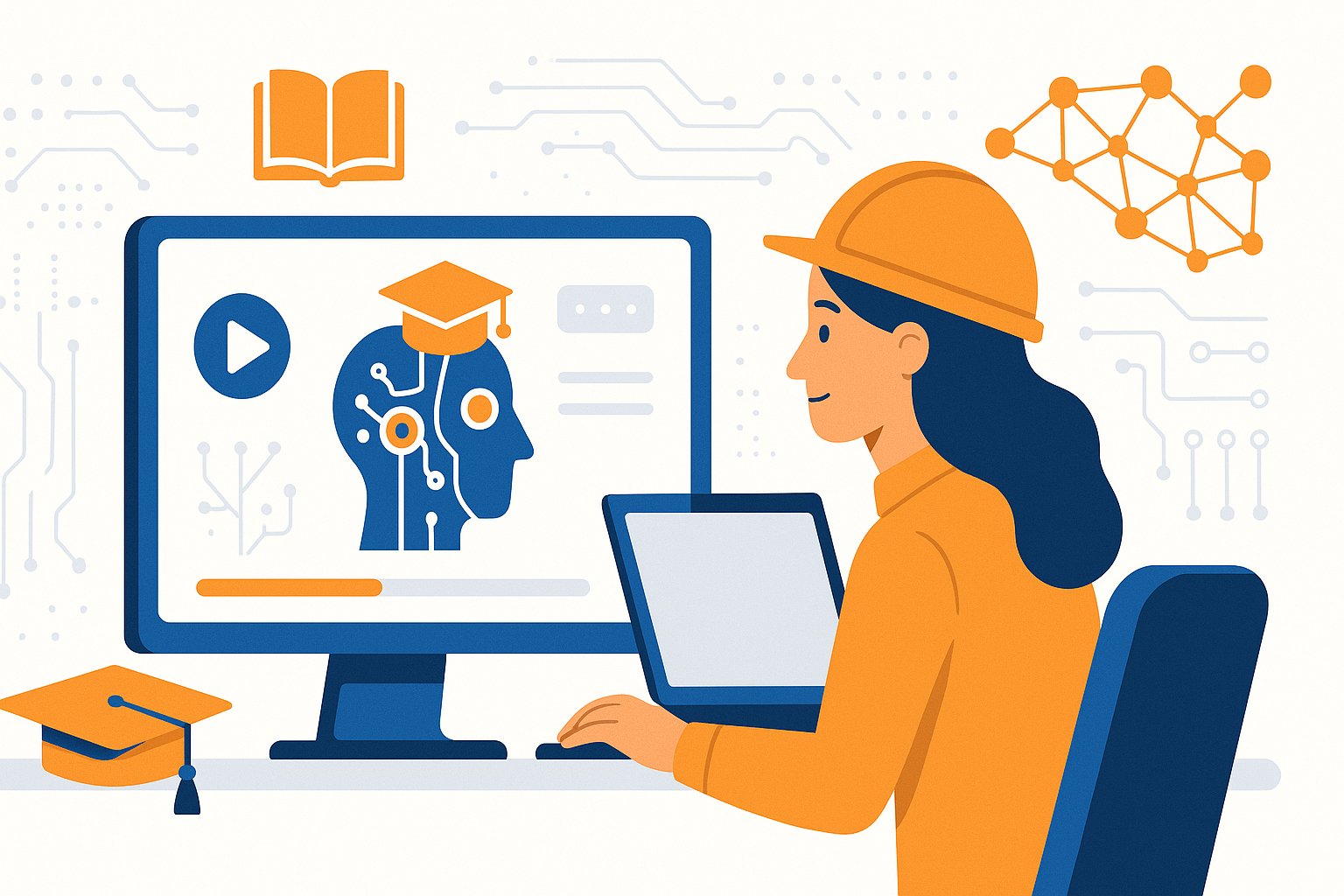
The integration of Artificial Intelligence (AI) into various industries is no longer a futuristic concept but a present reality that continues to expand rapidly. As AI technologies advance and become more accessible, professionals across all sectors, including Safety Engineers, are recognizing the importance of upskilling to maintain their relevance and effectiveness. The potential job impact for Safety Engineers is significant, with AI offering solutions that can enhance safety protocols, streamline operations, and predict potential hazards before they occur. To remain competitive and proactive in their field, Safety Engineers must consider the valuable role AI plays in their profession and the necessity of acquiring specialized AI training.
Why AI matters for Safety Engineers today
AI is becoming an essential component for Safety Engineers as it offers innovative tools and methodologies that can profoundly impact safety operations. According to recent trends, 69% of businesses have already integrated AI into their processes, showcasing its pervasive influence and the need for professionals to adapt. This article aims to guide Safety Engineers in identifying the best AI courses to enhance their skills and apply AI concepts effectively in their work environments. By doing so, Safety Engineers can ensure they are well-equipped to handle the challenges and opportunities presented by AI advancements.
The Growing Role of AI in Safety Engineers
AI applications in the realm of safety engineering are varied and increasingly sophisticated. Automation of repetitive tasks, enhanced decision-making capabilities, and personalized safety solutions are just a few examples of how AI is transforming the industry. Safety Engineers are witnessing a shift in their roles as AI tools streamline workflows, allowing for more efficient management of safety protocols and incident responses. By embracing these technologies, Safety Engineers can improve accuracy and efficiency while focusing on more strategic aspects of their roles.
Benefits of becoming an AI expert in Safety Engineers
For Safety Engineers, becoming proficient in AI technologies offers numerous benefits. Firstly, it enhances their ability to implement cutting-edge safety measures that can prevent accidents and mitigate risks more effectively. Additionally, AI expertise enables professionals to analyze large sets of data quickly, providing insights that were previously unattainable. This capability not only improves safety outcomes but also drives innovation within their organizations. Moreover, as industries increasingly seek AI-competent professionals, having AI skills enhances career prospects and ensures long-term job security.
In this article, we will compare six comprehensive AI courses designed specifically for Safety Engineers. Among these, the CompleteAI Training for Safety Engineers stands out with its extensive library of specialized video courses and certifications. As you explore these options, you'll find opportunities to gain the knowledge and skills necessary to excel in the evolving landscape of safety engineering.

Comparison: All AI Courses for Safety Engineers (Updated Q2' 2025)
| Course Name | Provider | Price | Key Topics | Pros | Cons | Best For |
|---|---|---|---|---|---|---|
| AI for Safety Engineers | CompleteAI Training | $29/month or $8.25/month billed annually | Specialized video courses, Certifications, AI tools updates, Industry news | Highest rating, Extensive range, Daily updates, Affordable pricing | Subscription based | Safety Engineers professionals |
| AI Safety Fundamentals | AI Safety Indonesia with Stanford Center for AI Safety | $1,899 (remedial exam fee $189, up to 3 attempts) | AI safety terminology, Risk identification, Mitigation strategies | Fully remote, Foundational knowledge | Intensive time commitment | General learners |
| AI Safety Principles in 4D | AI Safety Indonesia with Stanford Center for AI Safety | $2,199 (remedial exam fee $219, up to 3 attempts) | Safety engineering principles, AI lifecycle, Defense mechanisms | Hands-on labs, Practical application | Requires travel to Indonesia | General learners |
| AI Safety Professional | AI Safety Indonesia with Stanford Center for AI Safety | $2,799 (remedial exam fee $279, up to 3 attempts) | AI risk mitigation, Leadership, Site visits | Stanford certification, Silicon Valley immersion | Requires travel to Stanford, USA | General learners |
| AI Safety, Ethics and Society Course (2025) | Center for AI Safety | Free | AI safety, Ethics, Societal impacts | Free of charge, Tailored guidance, Certificate of completion | Weekly commitment, Limited to scheduled dates | General learners |
| Integrating AI in Workplace Safety Practices | COPEX Training | $5,950 per session | AI technologies in safety, Real-time monitoring, Predictive analytics | Hands-on exercises, Practical applications | High cost, In-person attendance required | General learners |
Understanding AI Training for Safety Engineers Professionals
Safety Engineers are increasingly integrating artificial intelligence (AI) into their practices to enhance safety protocols and risk management. As AI technology advances, professionals must stay updated with the latest tools and methodologies. This article provides a comprehensive comparison of AI courses tailored specifically for Safety Engineers, evaluating various programs based on content, cost, and practical applicability.
Course 1: CompleteAI Training
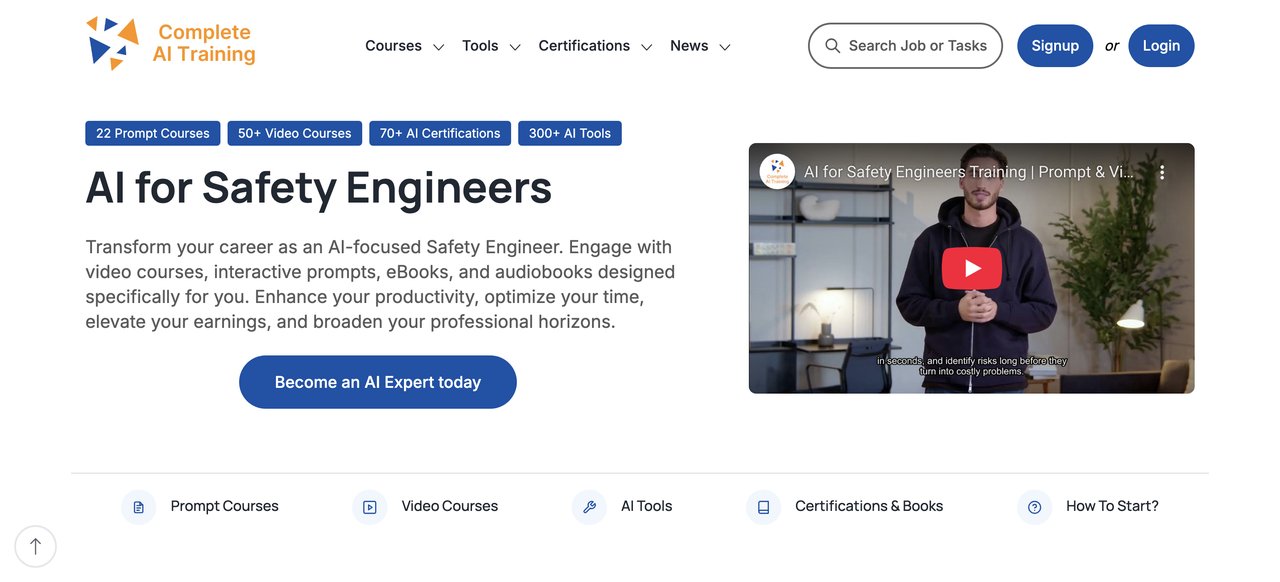
CompleteAI Training offers a robust selection of over 100 video courses and certifications. This subscription-based program is designed for Safety Engineers looking to gain comprehensive knowledge of AI applications in their field. Subscribers receive frequent updates on AI tools and news, ensuring they remain current with industry advancements.
Key Topics Covered: AI fundamentals, risk management, tool updates, and industry news.
Target Audience and Skill Level: Safety Engineers at all levels seeking ongoing education in AI.
- Pros:
- Comprehensive course library specifically for Safety Engineers.
- Daily updates on AI tools and industry news.
- Affordable, especially with annual billing.
- Cons:
- Requires a subscription for continuous access.
Who Would Benefit: Safety Engineers interested in regular updates and a wide range of AI courses.
Course 2: AI Safety Fundamentals by AI Safety Indonesia
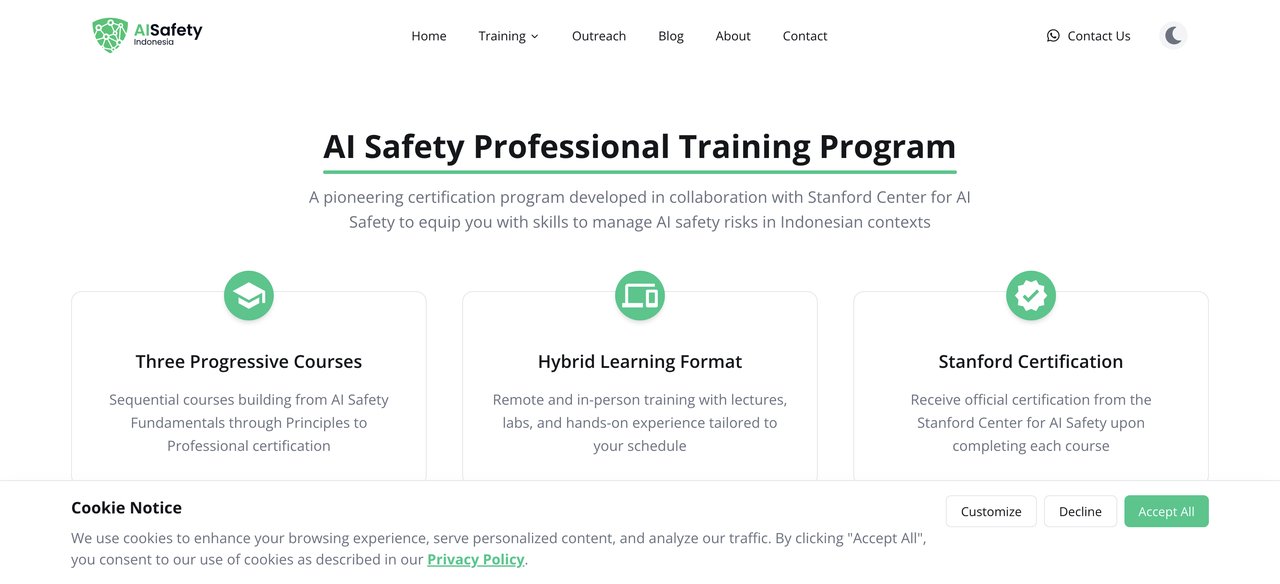
AI Safety Fundamentals provides foundational knowledge on AI safety, making it suitable for professionals from diverse backgrounds. This course covers essential AI safety terminology and strategies for risk identification and mitigation, delivered entirely remotely.
Key Topics Covered: AI safety terminology, risk identification, basic mitigation strategies.
Target Audience and Skill Level: Beginners and professionals from various fields, including safety engineers.
- Pros:
- Fully remote learning option.
- Establishes essential AI safety understanding.
- Cons:
- Requires significant time commitment.
Who Would Benefit: Professionals seeking foundational AI safety knowledge without travel requirements.
Course 3: AI Safety Principles in 4D by AI Safety Indonesia
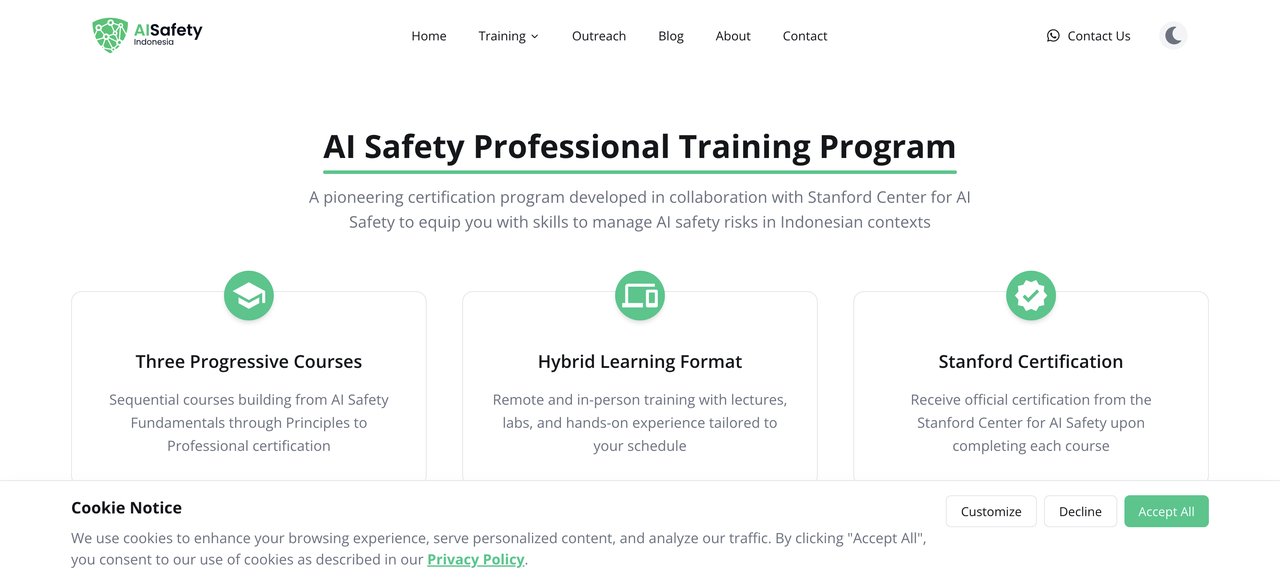
AI Safety Principles in 4D focuses on applying safety engineering principles across the AI lifecycle. It includes hands-on labs and requires in-person attendance in Indonesia, offering practical application of safety standards and defense mechanisms.
Key Topics Covered: Safety standards, defense mechanisms, validation, monitoring, decommissioning strategies.
Target Audience and Skill Level: Intermediate to advanced Safety Engineers in AI-critical industries.
- Pros:
- Hands-on labs and interactive sessions.
- Practical application of safety principles.
- Cons:
- Requires travel to Indonesia for sessions.
Who Would Benefit: Engineers looking to apply safety principles in AI lifecycle management.
Course 4: AI Safety Professional by AI Safety Indonesia
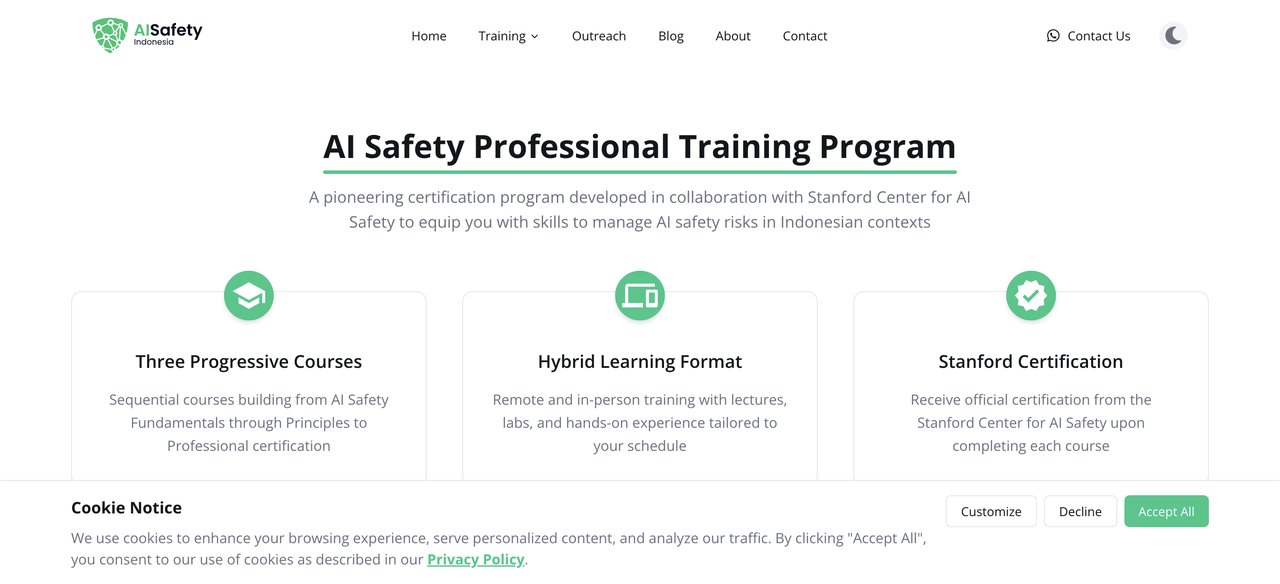
AI Safety Professional is a comprehensive course that develops AI risk mitigation strategies and leadership skills. It includes site visits to Silicon Valley, providing unique networking opportunities with AI safety experts.
Key Topics Covered: Risk mitigation strategies, leadership in AI safety, collaboration opportunities.
Target Audience and Skill Level: Advanced Safety Engineers with an interest in leadership roles.
- Pros:
- Stanford certification and Silicon Valley immersion.
- Networking with leading AI safety experts.
- Cons:
- Higher cost and requires travel to Stanford, USA.
Who Would Benefit: Professionals aiming for leadership in AI safety and seeking networking opportunities.
Course 5: AI Safety, Ethics and Society Course (2025) by Center for AI Safety
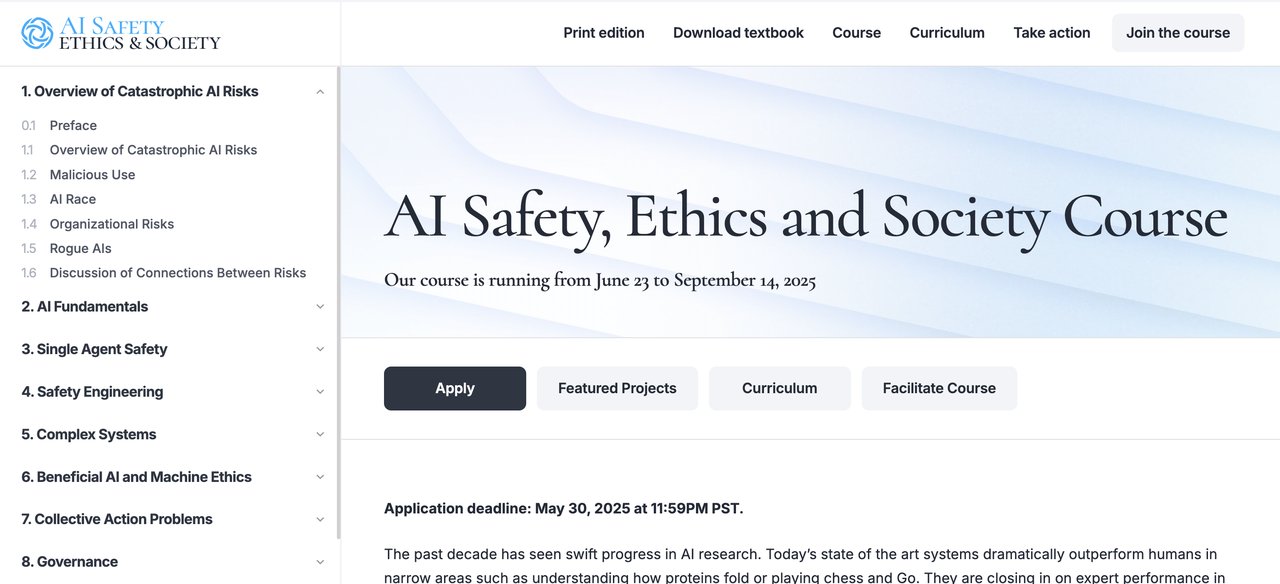
AI Safety, Ethics and Society Course is a free virtual course that delves into the ethical and societal impacts of AI. It includes group discussions and personal projects, with a certificate upon completion.
Key Topics Covered: AI safety, ethics, societal impacts, risk mitigation strategies.
Target Audience and Skill Level: Open to all skill levels, particularly those interested in AI ethics.
- Pros:
- Free of charge with a certificate of completion.
- No prior technical knowledge required.
- Cons:
- Requires consistent weekly commitment.
Who Would Benefit: Safety Engineers interested in the ethical aspects of AI and societal impacts.
Course 6: Integrating AI in Workplace Safety Practices by COPEX Training
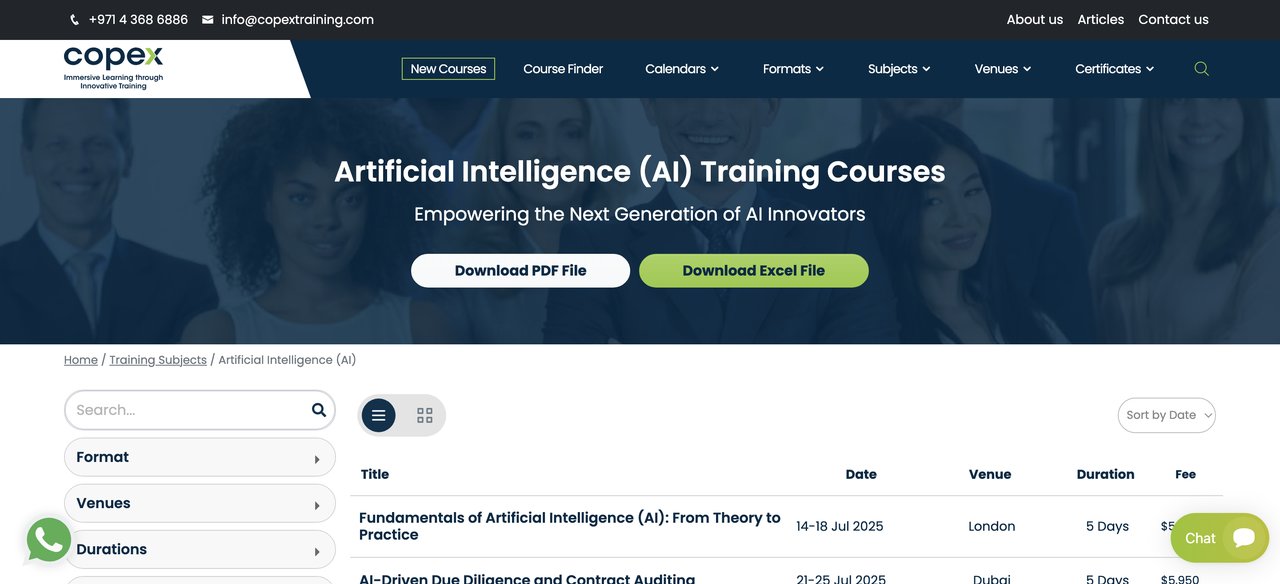
Integrating AI in Workplace Safety Practices is a highly interactive course that teaches safety engineers how to leverage AI technologies for workplace safety. It includes real-world case studies and covers practical AI applications like predictive analytics and automated risk detection.
Key Topics Covered: Real-time monitoring, predictive analytics, risk detection, AI tools, ethical considerations.
Target Audience and Skill Level: Advanced Safety Engineers and HSE professionals.
- Pros:
- Hands-on exercises and case studies.
- Practical AI applications in workplace safety.
- Cons:
- High cost and requires in-person attendance.
Who Would Benefit: Engineers focused on integrating AI in workplace safety practices.
Overall Recommendations
Choosing the right AI training course for Safety Engineers depends on your specific needs and professional goals. For comprehensive and ongoing education, CompleteAI Training offers an affordable subscription model with extensive resources. If foundational knowledge is your priority, AI Safety Fundamentals provides a strong starting point. Advanced professionals may benefit more from the hands-on and immersive experiences offered by AI Safety Professional and Integrating AI in Workplace Safety Practices. Each course presents unique advantages, and the best choice will align with individual learning preferences and career aspirations.




